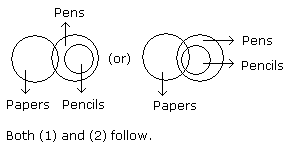Discussion
Home ‣ Verbal Reasoning ‣ Syllogism See What Others Are Saying!
- Question
Statements: Some papers are pens. All the pencils are pens.
Conclusions:
- Some pens are pencils.
- Some pens are papers.
Options- A. Only (1) conclusion follows
- B. Only (2) conclusion follows
- C. Either (1) or (2) follows
- D. Neither (1) nor (2) follows
- E. Both (1) and (2) follow
- Correct Answer
- Both (1) and (2) follow
Explanation
- 1. Statement
Politicians become rich by the votes of the people.
Assumptions
I. People vote to make politicians rich.
II. Politicians become rich by their virtue.
Options- A. Only Assumption I is implicit
- B. Only Assumption II is implicit
- C. Both Assumptions I and II are implicit
- D. Both Assumptions I and II are not implicit Discuss
- 2. How many steps will be required to get the final output from the following input?
Input :: 319 318 746 123 15 320 78 426
Options- A. four
- B. five
- C. six
- D. seven Discuss
- 3. If three days after today will be Tuesday, what day was 4 days before yesterday?
Options- A. Tuesday
- B. Sunday
- C. Monday
- D. Wednesday Discuss
- 4. Find the odd one out:
Options- A. 119
- B. 136
- C. 147
- D. 153 Discuss
- 5. RECOMMENDATION
Options- A. COMMUNICATE
- B. REMINDER
- C. MEDICO
- D. MEDIATES Discuss
- 6. _bbm_amb_m_a_bb
Options- A. mbabm
- B. abmab
- C. mabam
- D. ambbm Discuss
- 7. Statement
State Government imposes a monthly tax on the salary of all the employees. The tax amount varies according to the income slab. The Central Government also imposes tax. This is against the theory of taxation.
Conclusions
I. A regular collection, irrespective of the income slab, by the Central Government is the income tax
II. The Central Government should not collect any tax on income
III. Income tax should not vary according to the income slabs
IV. Tax should be imposed only once on an individual
Options- A. if only Conclusion I follows
- B. if only Conclusion II follows
- C. if either I or II follows
- D. if neither I nor II follows Discuss
- 8. Crocodile : Whale : Hippopotamus
Options- A. They are animals
- B. They are domestic animals
- C. They are land animals
- D. They are water animals Discuss
- 9. If India is one of the two countries chosen from Asia, how many possible combinations exist?
Options- A. Four
- B. Seven
- C. Six
- D. Five Discuss
- 10. Nitin was counting down from 32. Sumit was counting upwards the numbers starting from 1 and he was calling out only the odd numbers. What common number will they call out at the same time if they were calling out at the same speed?
Options- A. 19
- B. 21
- C. 22
- D. They will not call out the same number Discuss
More questions
Correct Answer: Both Assumptions I and II are not implicit
Explanation:
The statement implies that politicians win election by the votes of people. Therefore, neither of the assumptions implicit in the statement.
Correct Answer: seven
Explanation:
In this the numbers are arranged as follows. The least number followed by the highest number followed by the second least number followed by the second highest number and so on. This is done through the process of shifting the number. The given input is hence subsequent output is:
Correct Answer: Monday
Explanation:
Given that :- Today + 3 days = Tuesday
? Today = Tuesday ? 3 days = Saturday
Yesterday = Saturday ?1 day = Friday
Friday ? 4 days = Monday
Hence , required answer will be Monday .
Correct Answer: 119
Explanation:
Only 119 has different factors, 7 and 17 and no factors are repeated.
Correct Answer: MEDICO
Explanation:
From the given word, ' MEDICO' is the only word which can be formed.
Correct Answer: mabam
Explanation:
Given word is combination of mbb and maa.
Fill the missing letters as per above two words.
mbb/maa/mbb/maa/mbb ? mabam
Correct Answer: if neither I nor II follows
Explanation:
As tax should be imposed only once on an individual, only conclusion (d) follows.
Correct Answer: They are water animals
Explanation:
These all are water animals.
Correct Answer: Five
Explanation:
If India is chosen, japan cannot be the second country chosen from Asia.
1. One of the possible combinations will be :
India, Sri Lanka, UK, USA
2. The other combination will be:
(i) India, China, UK, France
(ii) India, China, UK, Germany
(iii) India, China, USA, France
(iv) India, China, USA, Germany
In all, there are five different ways in which the four countries can be chosen.
Correct Answer: They will not call out the same number
Explanation:
Nitin : 32 31 30 29 28 27 26 25 24 23 22 21 20.....................
Sumit : 1 3 5 7 9 11 13 15 17 19 21 23 25..............................
Clearly, both will never call out the same number.
Comments
There are no comments.More in Verbal Reasoning:
Programming
Copyright ©CuriousTab. All rights reserved.
